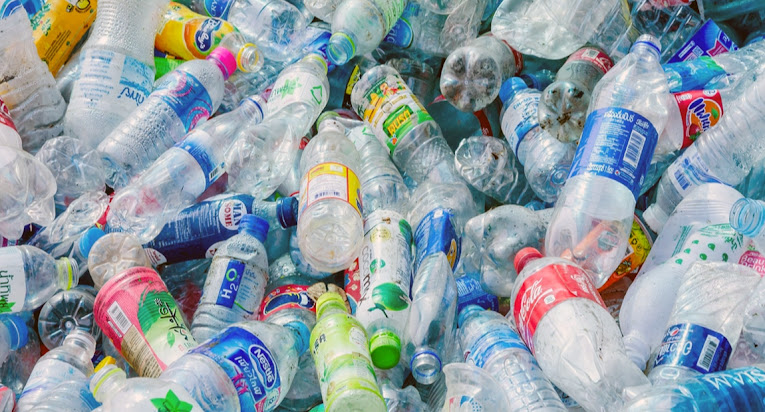 |
| Plastic bottles are gathered for recycling. Image Credit |
Researchers have warned that a commonly used type of recycled plastic bottle spills more potentially dangerous chemicals into its contents than newly manufactured bottles.
Brunel University London researchers have found 150 chemicals that leached into drinks from plastic bottles, with 18 of them finding quantities that exceeded standards.
They also observed that drinks bottled with recycled Polyethylene Terephthalate (PET) contained higher levels of pollutants than drinks bottled with new PET, implying that contamination may be caused by difficulties with the recycling process.
They are proposing for more careful recycling processes to eliminate potentially dangerous materials.
The thermoplastic PET is the third most extensively used form of plastic in food packaging, with single-use beverages bottles being one of its most common applications. As one of the most frequent forms of plastic litter, such bottles have prompted a lot of attempts to enhance PET recycling rates. PET bottles must include at least 30% recycled content by 2030, according to a recent EU directive.
However, PET is also known to be a source of a number of dangerous chemical toxins, such as endocrine disruptors like Bisphenol A, which can cause reproductive issues, cardiovascular problems, and cancer, among other negative impacts.
The researchers looked at 91 studies on chemical contamination from plastic bottles from around the world. "We found these chemicals can come from various sources, such as the catalysts and additives used during production and degradation during PET production, as well as degradation that can happen across a bottle's lifecycle," said Dr. Eleni Iacovidou, a lecturer from Brunel's center for pollution research and policy, who led the study.
According to the article published in the Journal of Hazardous Materials, many of the pollutants detected in recycled PET bottles were caused by contamination of the feedstock, including labels. "This evidence suggests that highly recyclable products, such as PET drink bottles, can be inapt for closed-loop recycling when poorly designed," the researchers wrote. "This evidence indicates the need for greater adoption of design-for-recycling principles and improvements at the waste-management infrastructure level."
The research suggests that a procedure known as the "super cleaning" process, which cleans old plastics in three stages before recycling – a high-temperature wash, a gas wash, and a chemical wash – could be used to minimize the number of chemicals detected in bottled drinks.
"Recycling procedures also involve cleaning bottles before turning them into secondary raw material for reuse," Iacovidou explained. We can increase the probability of decontaminating recycled PET to levels comparable to virgin PET by investing in innovative super-cleaning technologies."
The ultimate solution to the problem, as always, is for society to stop using PET completely, according to Iacovidou.
"We all have a portion of the responsibility. "We need to start thinking about how we can reduce our usage of PET bottles in our homes by investing in water filters or large water containers, as well as learning how to properly dispose of our plastic waste," she said.
"We will force change further up the chain if we minimize our PET consumption." In the first place, less demand means less production."
Source: The Guardian









0 Comments
please do not enter any spam link in the comment box